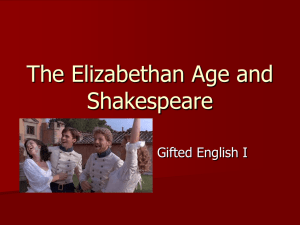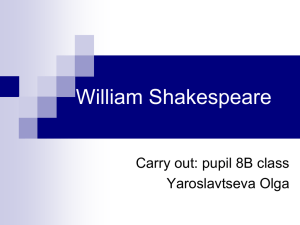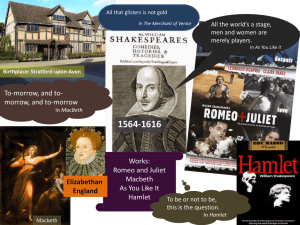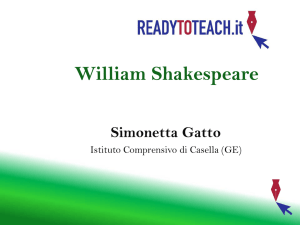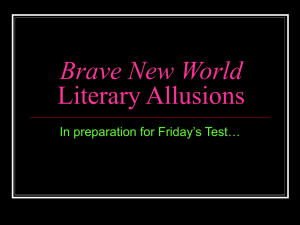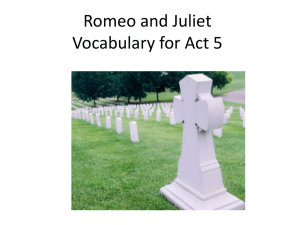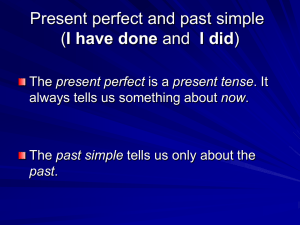EDUC 522 5E LESSON PLAN
advertisement
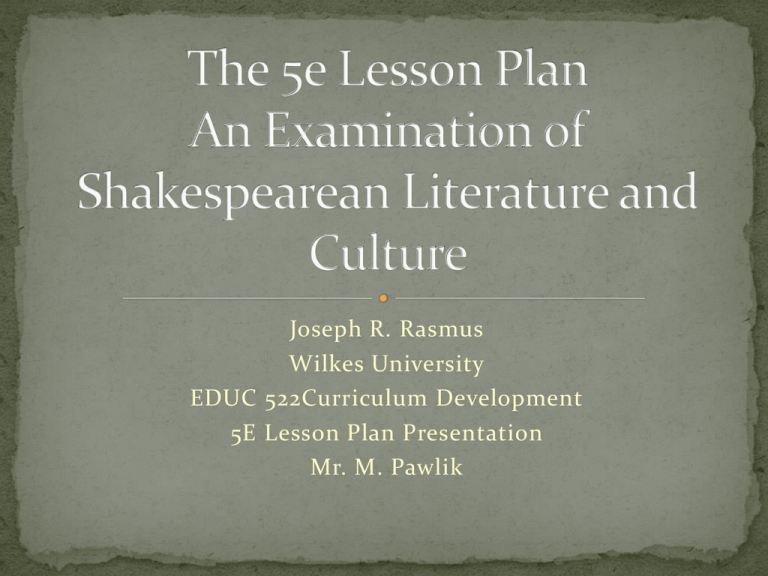
Joseph R. Rasmus Wilkes University EDUC 522Curriculum Development 5E Lesson Plan Presentation Mr. M. Pawlik Objectives: LOOK FORS: (1.) Students will identify five Shakespearean plays. (2.) Students will identify “What is the Elizabethan Renaissance?” (3.) Students will compare acting on the Shakespearean Stage to acting in contemporary theatre of cinema. (4.) Students will describe the structure of the Globe Theater. (5) Students will explain the differences between Elizabethan drama and modern drama. (6.) Students will analyze the acting conventions , history, theatre practices, and language of Elizabethan Renaissance. (7.) Students will collaborate and construct 2 authentic products which demonstrate their knowledge gleaned from unit of study. Activities: Activities span 5 Instructional days ENGAGEMENT: (1.) Students will engage in discovery lessonStudents will go to predetermined group areas and they will open the envelope situated on center desk. The members of the group are expected to analyze the pictorial artifacts found within the envelope, discuss commonalities amongst them and determine the era that they collectively represent. ANSWER: Elizabethan Renaissance. (2.) Students are directed to create 3 lists in their journal: List 1: Identify five plays or literary works which have been written by Shakespeare; List 2: Identify 3 things that you know about the Renaissance; List 3: List any one thing that you know about Shakespeare’s theatre. (3.) Students TPS. Discuss Responses. (4.) Student-centered discussion on list results. Students write items from lists on SMARTBOARD. Students compare class lists to their lists. EXPLORE: (1.) Students actively view United Streaming video (Standard Deviants School Shakespeare Tragedies: Module 01: Intro to Shakespeare [26:00 ], Open Link below to access.... Standard_Deviants_School_Shakespeare_Tragedies__Module_01Intro_to_Shakespeare_.asf (2.) Students complete “Guided Viewing Worksheet” and “Diagram of the Globe Theatre” as they view the video segments. Additionally students must seek to answer the 3 list questions more fully. Also they must define; “Aside,” “Soliloquy,” and “Imagery.” Learner should place all written responses in their literary notebooks. Students collaborate and conduct webquest. Students conduct significant research on defined topics. Students jigsaw and assume particular roles in the investigative process. Each role has specified “look fors.” Students place research notes in Literary Journal. When students complete research, students are expected to report back the content learned from their webquest to the other member of the group EXPLAIN: (1.) Subsequent to viewing video podcast modules, students regroup with their initial groups . (2.) Students play “Shakespeare Trivia,” whereby the content that was examined in the video podcast segments is reinforced and recalled by the students. Student groups are allowed rely upon the information that they recorded in their literary journal in order to respond to questions which relate to Shakespeare’s life, the Elizabethan Age, Shakespearean plays, his endemic language, and his literary legacy. After Students complete guided questions and other items to be discerned from video, synthesize two products which showcases their learning: PowerPoint/Scrapbook AND performance of scene from Macbeth/Performance of ORIGINAL scene based upon a scene from Macbeth EXTENTION: (1.) Provide students with a writing prompt: “How would a contemporary production of Macbeth differ from production set in Shakespeare’s 17th century?” Consider Acting, Staging, Play-going, Audiences, and Scenery. Students construct a five paragraph essay which conforms to: Intro, Body Conclusion format, the PSSA scoring rubric, and communicates the breadth of the students opinion Evaluation/Assessment: There are several assessments ingested throughout the lesson: Look for responses to discovery lesson Guided viewing questions from film Shakespeare Trivia 5 paragraph essay PowerPoint/Scrapbook—Presented formally to class Performances—Presented formally to class See Scoring Rubric for exact evaluation parameters. Materials: Literary Journal Discovery lesson artifacts in envelopes. Promethean board Laptop/projector Video: The life and times of Shakespeare, Shakespeare’s use of language, Elizabethan drama, the importance of words, Viewing Guide: the life and times of Shakespeare, Shakespeare’s use of language, Elizabethan drama vs. modern 3 Viewing Questions Worksheet: label the characteristics of the Globe Theater, thinking cap questions Activity: “Shakespeare Mania Trivia” Check Your Knowledge: true/false, multiple choice, and creative flow short answer questions\ The Activity This WebQuest asks students to explore the life and times of William Shakespeare. It is a look into the theatre of the day and the historical significance of the Elizabethan era in terms of how we view his work. The importance of creative process is emphasized here as Shakespeare is a dramatic medium. Students will share the information that they cultivate with the groupmates with whom they are collaborating. Groups will collaborate to create authentic products which reflect the depth and breadth of their respective investigation Introduction We are about to begin reading Macbeth by William Shakespeare. But do you really have a good grasp of what life was like when he was alive? What kinds of things did he write? What types of literature did he write? How does the theatre of the Elizabethan Renaissance compare to that of today’s playgoers? Who were the craftsmen and artisans who collaborated to create a theatrical event in Shakespeare’s era. These and many other questions will frame our investigation into the literary contributions and significance of the most prolific and well-known author of all time. We're going to use the web to delve more deeply into the life and times of William Shakespeare as we prepare to read his play, Macbeth. You and your group mates will engage in an inquiry-based learning activity whereby , you are required to ascertain predetermined information that relates to our examination of Shakespearean Literature. Each group will study the various aspects of the history, culture, theatre, and writings of William Shakespeare and Elizabethan England. You will be asked to work together to complete a creative presentation of that information. Your final product will include a performance of a scene from Macbeth, or a revisionist scene that your group writes and performs, and a Power Point, and a Scrapbook that your group creates. Process The following is a brief overview of the steps you will need to take to complete this webquest. Look under phase one, phase two, or phase three for more detailed instructions. 1. You will be assigned a group. Once in your groups, assign a role to each person in the group: actor, historian, director, and linguist. 2. Do your research on the websites provided for your assigned role. 3. Teach your group about what you have learned. 4. As a group decide what the important aspects of each topic are. After analyzing your information, decide as a group how to synthesize it in order to plan a creative presentation. You will have 2 finished products: (1) a skit, or performance, and (2) a scrapbook or PowerPoint 5. Begin your scrapbook/PowerPoint 6. Begin conceptualizing your contemporized skit, determine plot synopsis, analogous characters, and cultivate script. OR begin scene study of scene from Macbeth…. Rehearse…prepare programs, costumes, and props…Perform for class on ASSIGNED DUTE DATE--Check syllabus for groups’ assigned presentation dates!! Phase One: “Research/Analysis” Each role is responsible for gathering knowledge based on the following areas of interest: Actor: You will research all aspects of acting in Elizabethan England, and those methods still used in performing Shakespeare today at the newly reconstructed Globe Theatre. Use the links below to explore all that actors did, and perhaps who some of those actors were as well. Performance Library Edward Alleyn Theatre Historian: You will research all aspects of the culture and history of Elizabethan England and the life of William Shakespeare. Use the links below to explore. Shakespeare: Life and Times Birthplace Trust Seven Ages of Shakespeare Biography on A&E Elizabethan Era Director: You will research theatre practices of Elizabethan England. Look at the things done at the Globe then and now, as well as at other theatres of Shakespeare's day. Use the following links to explore. Online Reference Library Shakespeare in Performance Shakespeare's Theatres Theatre Linguist: You will research the plays and poetry of William Shakespeare and the language he used. Use the following websites as you explore what he wrote as well as the way he wrote it: Library: Plays and Poetry Quotations Index Shakespeare Insult Kit Phase Two: “Collaboration and Cooperative Learning” As you look at each other's data be sure to take the time to discuss how to best use the information. As a group decide what the important aspects of each topic are. After analyzing your information, decide as a group how to synthesize it in order to plan a creative presentation. You will have 2 finished products: A performance of a scene from Shakespeare’s tragedy Macbeth that demonstrates aspects of the historical and theatrical significance of Elizabethan England, OR a contemporized scene which attempts to relocate Shakespeare’s iconoclastic characters and their actions in a contemporary context. A scrapbook in which you simulate photos, newspaper clippings of the time, and/or artifacts that address every aspect of cultural and literary analysis selected, OR a PowerPoint Presentation which provides class audience with a well-informed examination of the selected research foci. Phase Three:”Synthesis” You may wish to split the work so that you can accomplish the first two tasks more quickly. Perhaps dividing the group in two would help, though keep in mind that all group members are responsible for the work, and all members must be involved in the presentation of the skit/power point and scene. 1. Begin to prepare your scrapbook: Use photographs, create newspaper headlines, write brief articles that help to illustrate the different things you've learned about the world of Shakespeare. Your book should be a minimum of 3 pages long. You may decorate the pages as you wish (for any scrapbookers out there). 2. Begin to prepare your PowerPoint: What do you wish to portray about the cultural and historical aspects of your research? Have you provide adequate information on each topic identified? **Imagine you are the teacher--imagine that the students are unfamiliar with the content…What would they need to learn?**Power Point presentations can be rather boring if you read the slides to us, make sure you're doing something interactive if you opt to do this type of presentation. If you choose your perform a scene from Shakespeare’s original text or write an original script. Make sure everyone knows their lines. DO NOT AD LIB! Be certain that the actions are blocked and well rehearsed 3. Begin to rehearse your scene: Divide parts: you may do this any way you wish, but all group members must be involved at some point. Rehearse the lines on your feet! Use Shakespeare's language - try to speak with meaning and emotion if you can. Invest characterization into your portrayals!!!! Conclusion Most of your impressions of Shakespeare are from sitting in class reading his plays aloud to a room full of disinterested parties. Hopefully you have begun to see the truly interactive nature of both Shakespeare's time and the plays themselves. We will begin to work on Macbeth in a way that reflects the things you've learned during this WebQuest, so after you've done your research ask yourself the following questions: Would I have liked life in Shakeskpeare's day? What are your impressions of Shakespeare? (the man or the writings) What new or different things about theatre did you learn? Could I have been an actor in Elizabethan England? What have I learned about Shakespeare's language? In your groups discuss these topics. Write a journal entry that addresses the above, and other things you've learned from working on this project together. This entry is due upon completion of your group presentations. Standards 1.1.11.A; 1.2.11.b; 1.2.11.c; 1.3.11.a; 1.4.11.a; 1.6.11.c; 1.6.11.d; 1.6.11.e; 1.6.11.f; 1.8.11.a; 1.8.11.b; 1.8.11.c


